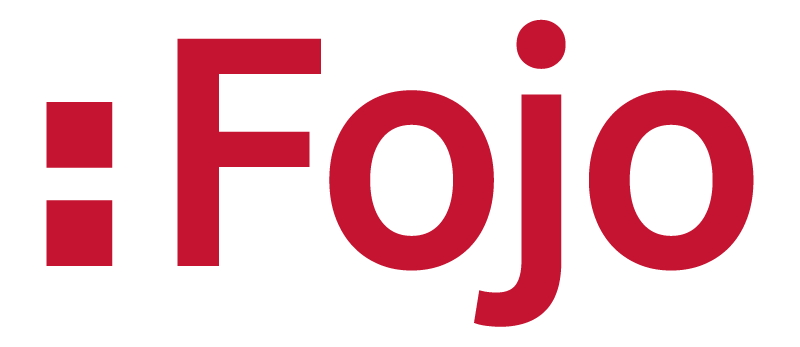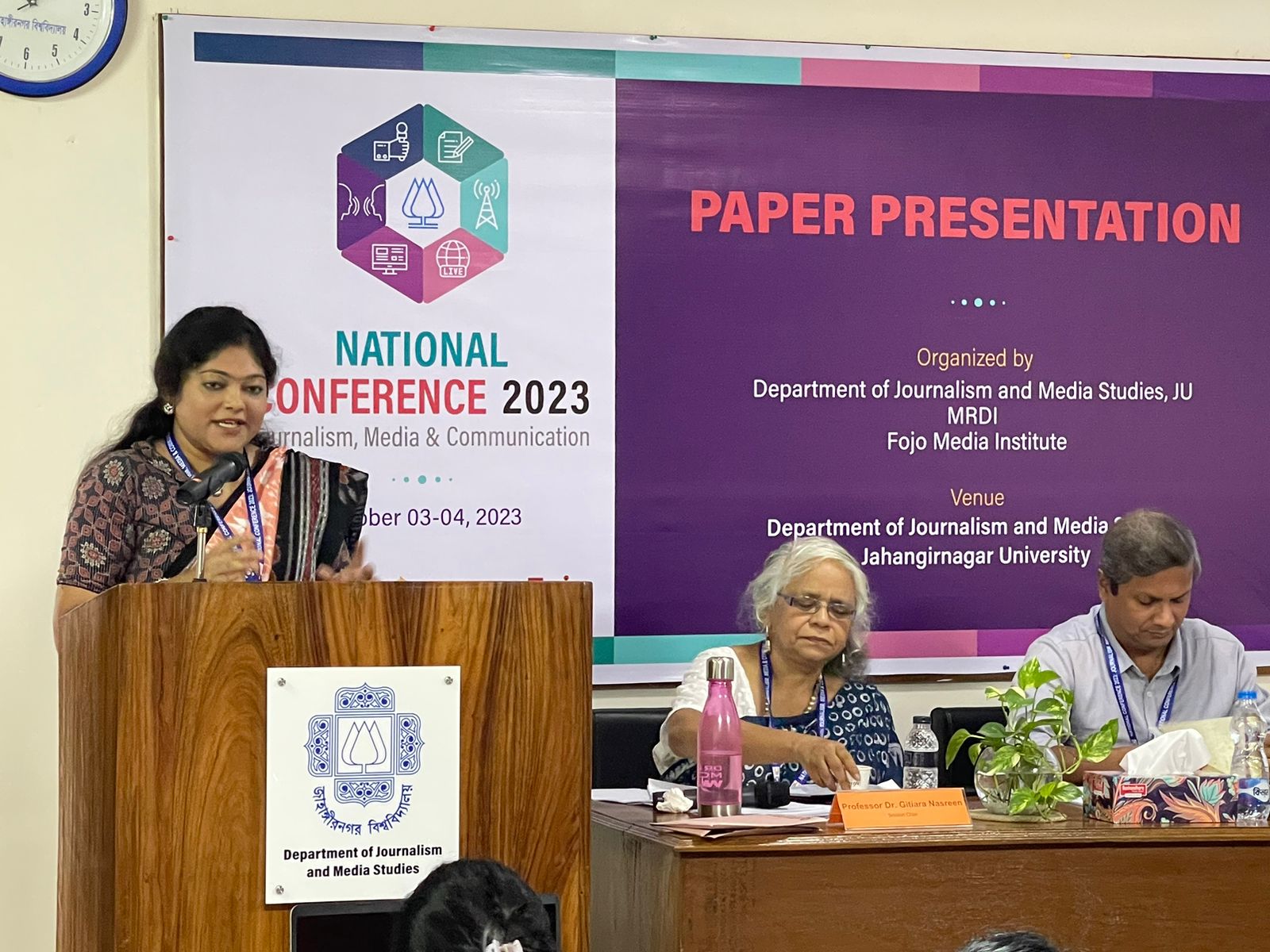National media from across Bangladesh gathered to discuss common challenges in Dhaka at the beginning of October. The conference provided a unique platform for individuals from the journalism industry, academia, and students to engage in meaningful discussions and exchange ideas on journalism, communication and media with each other.
The thematic focus of the two-day national media conference was deliberately broad; covering how to bridge the gap between newsroom and classroom, gender equality in the news industry, digital transformation and the importance of fact-checking. Bringing together journalists and media professionals from all over Bangladesh, it ended up being the strong networking opportunity that the organisers had hoped for.
Apart from providing a space to form new collaborations and future courses of action The National Media Conference, held at Jahangirnagar University Campus in Dhaka on 3-4 October and co-arranged by Fojo and its partner in Bangladesh MRDI, also offered the opportunity for 26 papers covering an array of areas concerning media and journalism to be presented by teachers and students from ten different universities in Bangladesh and India. The key sessions on “Journalism Practices in Bangladesh: Challenges and Prospects” featured a total of 20 speakers from both academia and journalism.
Staff from Fojo’s partner organisation MRDI attended the conference and took the opportunity to speak to a handful of participants:
Rakib Ahmed
Associate Professor and Chairman, Department of Journalism and Media Studies Jahangirnagar University
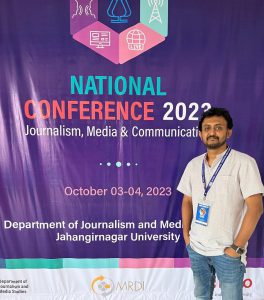
Why is this conference important?
”We believe that the ongoing transformation in journalism has created a gap between industry and academia. With this conference, structured around three themes – journalism, media, and communication, we have received many papers from researchers focusing on journalism in Bangladesh. If we can showcase and emphasise how researchers perceive the challenges and opportunities in journalism, I am confident that it will be helpful in addressing these challenges from an academic standpoint.”
”Also, the conference has provided a platform for individuals from the journalism industry, academia, and students to engage in meaningful discussions and exchange ideas on journalism, communication, and media with each other.”
”Furthermore, in Bangladesh, research related to journalism is quite limited and there is a significant shortage. A conference of this nature encourages and motivates these researchers to engage in studies that can make valuable academic contributions to the field of journalism, ultimately enhancing the quality of journalism in the country.”
What have you learned at the conference?
”This conference has made me realise that there is a significant number of young individuals who are either already engaged in or keen to pursue research on communication, journalism, and media. However, they require a platform for their aspirations. Hosting more conferences like this can bring experts together and facilitate additional research in this field. Journalism, communication, and media are currently undergoing a substantial transformation, and we need more research to cover these changes. While there is substantial global research in progress, we anticipate more conferences and local perspective research initiatives in Bangladesh.”
”A key take away from this conference is that such events are feasible even with limited resources. There is a keen interest from many individuals to work on and collaborate in this field. We received 55 paper submissions for the conference, and it was challenging to accommodate all of them; in the end, we could only include 26 papers. This experience has been a significant lesson for me.”
What are the next steps for your department after the conference?
”We are greatly motivated by the success of this conference and are exploring the possibility of organising it annually. It doesn’t necessarily have to be a national level event every year, rather we are considering organising issue-based conferences, such as those focused on investigative journalism, political reporting, various journalistic beats, or sectors. There are many opportunities to explore different subjects in the future.”
”Furthermore, all the research papers presented at this conference will undergo a rigorous review process. Based on the final feedback and approval from the reviewers, we will proceed with the publication of these journals to facilitate further learning and knowledge dissemination.”
Tasnuva Alam Ahona
Master's student, Department of Journalism and Media Studies, Jahangirnagar University
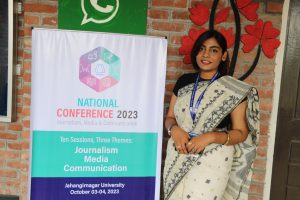
Why are you attending this conference?
”I’ve had a longstanding interest in research, particularly in the fields of journalism, communications and media. However, I had not come across any conferences in this domain until now and this is why it attracted me.”
What have you learnt at this conference?
”I had the privilege of presenting the paper ’Meme-marketing in the strategic communication field of Bangladesh’ at this conference. My experience left me wondering why we didn’t have such opportunities earlier. The conference exposed me to various research methodologies, the thoughts and insights of fellow researchers who presented their papers, and the valuable feedback from session chairs and participants. I learned so many new things that will undoubtedly shape my future research initiatives.”
How will you use this knowledge after the conference?
”My immediate plan is to further develop my research based on the insights I gained at the conference and work towards publishing this paper using the knowledge acquired. Additionally, the networks I formed have opened up exciting avenues for future research collaborations on different topics.”
Sraboni Akter
Master's student, Department of Journalism and Media Studies, Jahangirnagar University
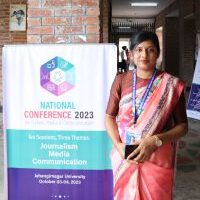
Why are you attending this conference?
”The subject matter of this conference aligned perfectly with my interests. As someone keenly interested in journalism, media, and communications research, I had been seeking an opportunity to participate in a conference focusing on these areas.”
What have you learnt at this conference?
”To say that this conference exceeded my expectations would be an understatement. It connected me with researchers and educators from both Bangladesh and India. Witnessing presentations and receiving diverse feedback expanded my research perspective. Additionally, several papers shed light on the challenges and opportunities of journalism, some associated with pros and cons of artificial intelligence, a topic I found particularly intriguing.”
”Experienced researchers’ presentations motivated me to consider a research and academic career. Building connections with teachers and researchers from various universities was also invaluable, inspiring my future research pursuits.”
How will you use this knowledge after the conference?
”I previously had reservations and fears about research, but now I believe it’s challenging yet achievable. The conference equipped me with valuable skills, such as presenting and defending research papers, and I plan to use references from the papers presented on my chosen topics in my future work.”

